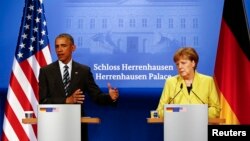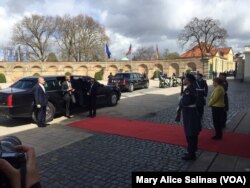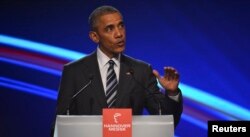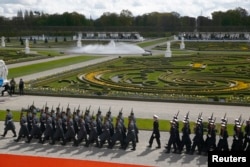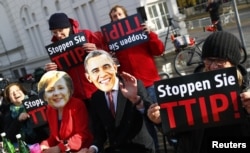U.S. President Barack Obama said the United States and the European Union must move forward on a landmark free-trade agreement, despite strong opposition to the accord.
"It is indisputable" the United States has benefited from free trade, as have other countries that engage in it, Obama said during a joint news conference with German Chancellor Angela Merkel in Hannover, Germany.
The United States and Germany are among each other’s largest trade partners and hope to build support for the Transatlantic Trade and Investment Partnership.
Pros, cons
Germany's government has pushed the T-TIP deal, saying it would boost the global economy and give small and mid-sized companies a better chance at competing on the world market, while reducing bureaucracy.
Opponents have been critical of what they perceive as opaque negotiations carried out away from public scrutiny, and they fear the pact will hand too much power to big multinationals at the expense of consumers and workers.
Officials have estimated the U.S.-Europe deal would add $100 billion annually to the economies on both sides of the Atlantic Ocean.
Obama argued some oppose the deal because they are “unsettled by globalization,” but most “people recognize on balance that it is a good idea.” He predicted a deal would be reached before he leaves office in January, although it will take longer to ratify.
The United States will “make every effort” to reach an agreement this year,” he said later at the spectacular opening of the Hannover Messe, a massive trade fair for industrial technology.
The European Union and United States have been negotiating since 2013, and supporters hope T-TIP deal will gain momentum now that the United States, Japan and other Pacific Rim nations have reached an agreement on a separate deal.
Obama began his two-day visit by holding talks with Merkel on a broad range of pressing global issues, including terrorism, the migration crisis in Europe and transatlantic security.
Terrorism
On terrorism, Obama said the United States and Germany are committed to using all "the tools at their disposal to prevent terrorists from plotting attacks."
Germany is a member of the U.S.-coalition against Islamic State.
Obama said the two discussed additional steps NATO can take to support the campaign and economic assistance the G-7 can pledge during a summit in Japan next month.
Merkel said while she supports a classic "safe zone" in Syria, she hopes the peace talks going on in Geneva could pave the way for a humanitarian area for refugees.
Obama said a safe zone in Syria would be difficult without a large military commitment. He added the issue “is not a matter of an ideological objection,” but rather “a very practical issue about how you do it.”
Both expressed concern a cease-fire in Syria had not held in recent days.
"We continue to believe that the only durable solution is a political solution that leads Syria to an inclusive government that represents all Syrians,” Obama said.
Ukraine
In Ukraine, “unfortunately we don’t have a stable cease-fire,” said Merkel, and she urged Ukraine and Russia to fully implement the Minsk agreement “as quickly as possible.”
They also discussed the importance of backing a fragile unity government in Libya.
On Monday, Merkel and Obama will hold talks with their counterparts from Britain, France and Italy.
The leaders will discuss “the full range of challenges we face together,” Obama told reporters.
White House officials say that will include talks on the NATO summit in Warsaw in July.
Obama said given the increased pressure Europe is facing from the south and aggressive and enormous spending by Russia it is important for NATO members to meet alliance obligations.
Obama will cap his visit with a speech Monday outlining his vision for future U.S.-European relations.




